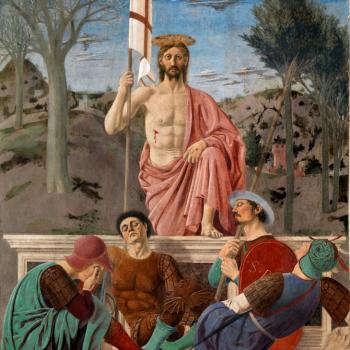The Adventurous Lectionary – Palm and Passion Sunday – March 25, 2018
Bruce G. Epperly
Mark 11:1-11
Philippians 2:5-11
Mark 14:1-15:47 (or 15:1-47)
Palm Sunday is a challenging holy day in the life of the church. As entry point to Holy Week, it is the beginning of an emotional and political roller coaster. Despite the celebrative atmosphere of Palm Sunday, many congregations join palms and passion, hoping to counteract diminishing attendance at Holy Week services. It is believed that folks need to experience the Cross before the ecstatic celebration of Easter. Apart from experiencing Christ’s suffering, Easter lacks gravitas and promotes an unrealistic prosperity and success oriented faith. I agree with this sentiment but recognize that celebrating Palm and Passion Sunday together may lead to an overly wordy, cerebral, and thus mind-numbing service. Going from celebration is problematic and misses the reality of personal and global suffering. The Palm/Passion Sunday challenge is to portray celebration and desolation, joy and sorrow, and affirmation and betrayal in ways that touch the human spirit. Simplicity is essential in this service, when it comes to scripture. Less is better than more, when it comes to scripture readings, so I prefer the shorter version from Mark’s gospel. If possible include multi-sensory experiences or a readers’ theatre if the passion as well as the palm processional reading is included. These are necessary, if, as in many congregations, the service is intergenerational.
The day begins with celebration, but the celebration is not whole-hearted or unambiguous like the revelries following the Super Bowl or World Series championships, New Year’s Eve, or the joy of a wedding, birthday, or life passage. There is laughter and elation and people are caught up in the affirmation of Jesus. He rides through town in majesty and some may believe that a new political era is on the way. Still, the ambience is ambiguous. There is conflict at the fringes of the parade. Darkness is coming. Political and religious leaders are scheming. The possibility of legal action and condemnation is on the horizon.
Palm Sunday is about Jesus and us. It portrays the fickleness of fame and popularity. It presents to us our own spiritual fickleness and inability to commit ourselves fully to God’s way, especially in times of conflict. Palm Sunday excitement and success-oriented faith is replaced, even among the Hosanna singers, by cynicism, self-interest, and abandonment when the going gets tough. We hope that we aren’t the people who would desert Jesus or worse yet cry out for Barabbas’ freedom rather than Jesus’ exoneration. But as the tide turns, we might find a safe spot to observe, becoming as Thomas Merton says “guilty bystanders.”
The roller coaster of Holy Week begins with celebration and the expectation of a new age emerging. Hosanna carries the subtext, “throw the rascals out” and install a new political and religious order. That’s not Jesus’ mission. It may not be ours as well. While we might politic for transformed economic, immigration, environmental, and foreign policy, we must be both “in but not of” these conflicts. Jesus has strong beliefs and they will take him to the cross, but he refused to be entangled in political partisanship or polarization. God’s way must embrace celebrants and mourners, liberals and conservatives, quietists and activists. We don’t need to emulate media and political polarization and vilifying of opponents to promote God’s realm.
To me the central Palm/Passion Sunday passage is Philippians 2:5-11. This passage describes another kind of power and different type of victory, indeed another kind of God than is often paraded by today’s court preachers, conservative evangelicals, and televangelists. The Messiah, the Christ, wins by becoming one of us, taking on our fallibility and finitude, and transforms us from within on our plane. Christ does not “lord it over” us; Christ heals by inclusion and hospitality, by creating a realm in which there are no “others,” a realm in which even those we hate are wooed toward wholeness and salvation. In Christ’s victory, everyone bows down before him out of love, not fear of reprisal. Paul’s listeners would have been shocked by this redefinition of power, contrary to the ways of the world and to policies of Caesar. Paul affirms, to use Crossan’s imagery, a realm of “nuisances and nobodies,” but goes beyond to claim that even the powerful and contrary are welcomed into God’s realm.
Philippians 2:5-11 invites us to share in the mind of Christ and to look at our politics and decision-making in terms of relational rather coercive and unilateral power. Unilateral images of God lead to unilateral understandings of power, evident in the perorations of many of today’s court preachers’ denunciation of LGBTQ+ folk, immigrants, and Trump critics. In exploring new images of relational power, we need to begin with our families, friendships, and congregational life. This process is slow and less decisive than practicing coercion and defeat. Yet, it maintains relationship, and leaves the door open for reconciliation and the honoring of diverse viewpoints. While a “kenotic,” sacrificial and self-emptying approach, may not be appropriate in foreign policy or the policing of our streets, it inclines us to confront opposition and violence spiritually as well as coercively. Those who do wrong must be apprehended and their impact neutralized, but in the process they must still be seen as God’s beloved children. Our nation’s opponents must be confronted, but our own complicity in violence and injustice must be recognized and our foreign and economic policy transformed, so that we don’t succumb to demonization. Deep down there is something of God even in the vilest offenders and if we are to have hope for the future, we must be willing to look beyond the exterior and work toward reconciliation.
Palm Sunday invites us to experience the full roller coaster of life – and discover in the interplay of joy and sorrow, which awakens us to the divine possibility of healing and reconciliation in the chaos of our own ambiguous lives. (For more on a relational vision of God, see Bruce Epperly, “Process Theology: Embracing Adventure with God” and “Process Theology: A Guide for the Perplexed,” and Thomas Jay Oord, “The Uncontrolling Love of God: An Open and Relational Account of Providence.”
















